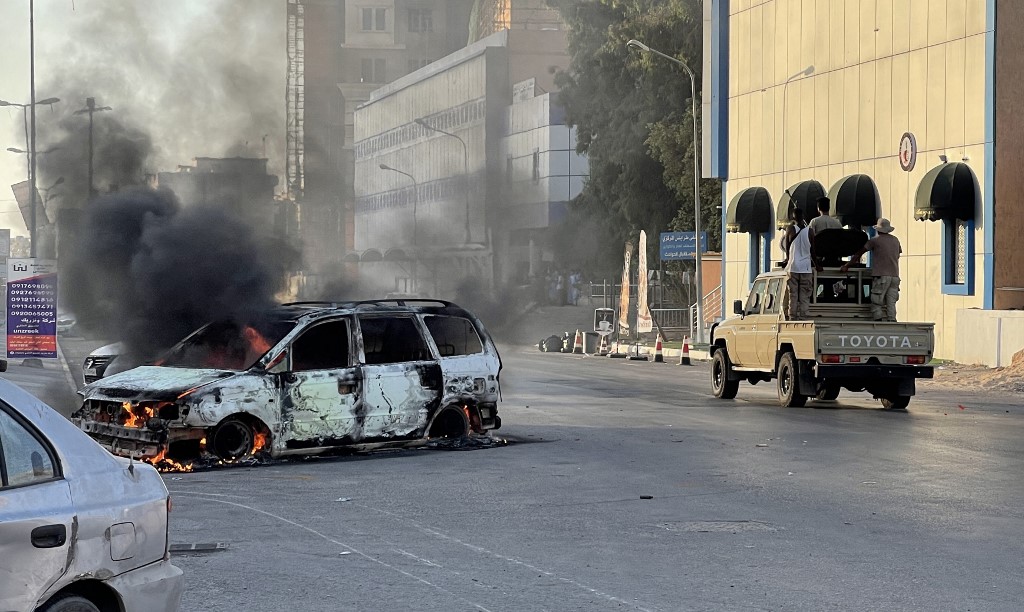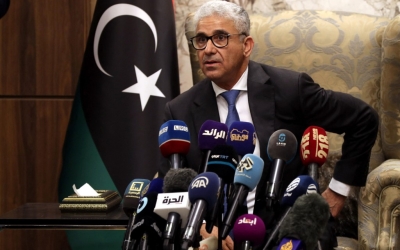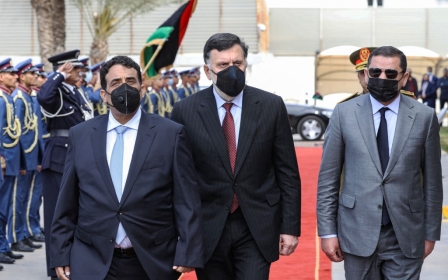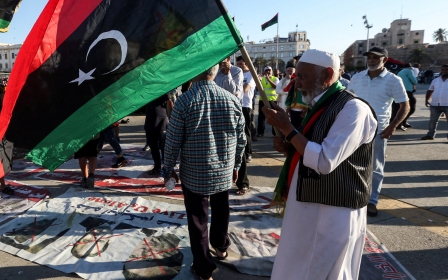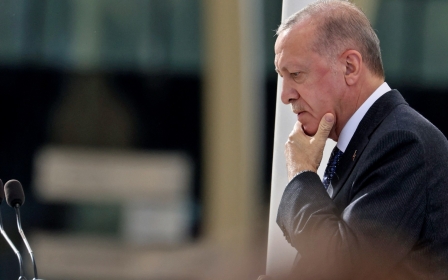Libya crisis: Are Qatar and Egypt crafting a deal?
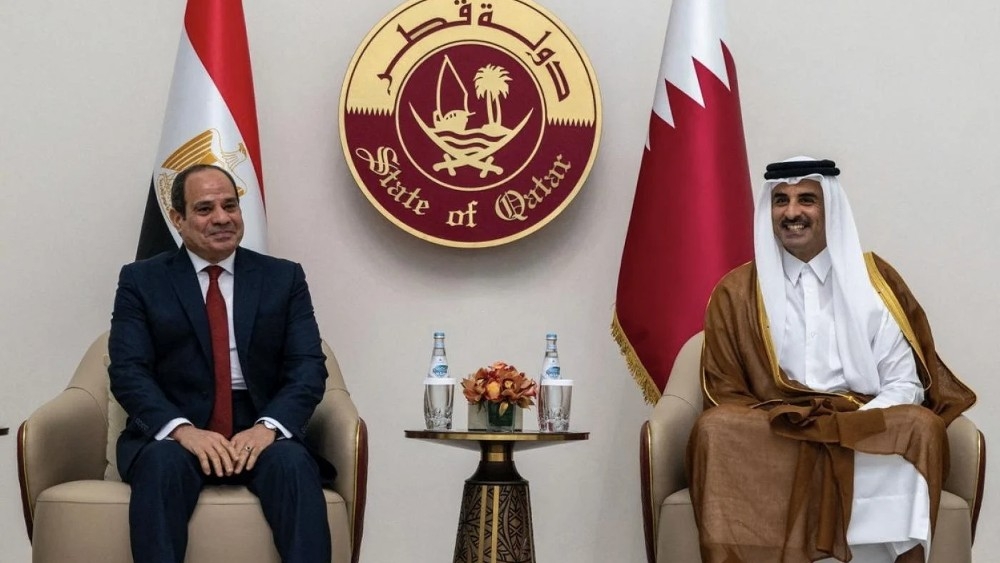
When Egyptian President Abdel Fattah el-Sisi arrived in Doha on 13 September, commentators were quick to interpret the visit as a debtor flying to meet an important creditor in the Gulf. This in itself might already be noteworthy, considering that both countries have had a frosty relationship since the 2013 military coup in Egypt.
Yet, what is more remarkable is that both Egypt and Qatar have carved out a space for bilateral relations that moves beyond financial ties to geo-strategic portfolios - Libya being the most pressing one as of late.
As an authoritarian state with an appalling human rights record, Egypt has struggled to present itself as an indispensable regional partner to the West. Sitting on the fence amid the Ukraine war, and maintaining relations with the Assad regime in Syria while clamping down on any form of civil society at home, Egypt has been eager in recent years to position itself as an integral deal-maker in the region. Here, Qatar has been an important force multiplier for Egypt, especially in Gaza.
Qatar's balanced approach to the region since the heyday of the Arab Spring transformed the Gulf state in the eyes of Cairo
Qatar, which has U-turned on its more activist Arab Spring policy since Sheikh Tamim Bin Hamad Al Thani came to power in 2013, remembered what it does best: bringing unlikely parties together to mediate political solutions to violent conflict. It is here that Qatar has become particularly appealing to Egypt. Qatar’s balanced approach to the region since the heyday of the Arab Spring transformed the Gulf state in the eyes of Cairo from a threat to regime security to a pragmatic broker whose networks can advance Egypt’s regional interests.
Ideological differences remain over Qatar’s anti-authoritarian stance, as well as Doha’s more inclusive approach to multi-stakeholder engagement. But when it comes to Libya, Qatar’s rather quietist, multilateral approach since 2014 appears to offer a degree of pragmatism necessary to secure Egypt’s own interests.
New MEE newsletter: Jerusalem Dispatch
Sign up to get the latest insights and analysis on Israel-Palestine, alongside Turkey Unpacked and other MEE newsletters
Doha’s equal distance between Cairo and Ankara allows Qatar to play a mediating role in what was an East-West divide in Libya, which in recent years has devolved increasingly into a multipolar, protracted conflict along more than just ideological lines.
Quest for stability
It is here that Egypt’s military establishment might have re-evaluated the security situation in Libya, after violent clashes in Tripoli a few weeks ago returned the country to the brink of civil war. For years, Egypt has invested in the counterrevolutionary infrastructure that the United Arab Emirates helped to install in eastern Libya.
Driven by the objective of keeping eastern Libya stable in the face of post-revolutionary chaos, Egypt’s military has long been convinced that the Egyptian-Libyan border region was best secured by a strongman wielding a monopoly over violence. Warlord Khalifa Haftar appeared to be just the man. But after several failed coups and countless military operations over more than eight years, the aging strongman - once powerful enough to co-opt and coerce Libya’s east into submission - appears too weak to keep competitors from Libya’s western spectrum from challenging his legitimacy.
Egypt’s closest partner, the UAE, has time and again shown that its ability to control its surrogate Haftar and his self-styled Libyan National Army (LNA) was limited. And while for the UAE, as for Qatar, the situation in Libya has few direct implications on national security, Egypt does not have the luxury to experiment in Libya. The fear of a spillover of instability is real and predates the 2011 revolution.
Meanwhile, Qatar, since stepping away from Libya in 2014, has become less of a contentious player for Egypt. Although Qatar, unlike the UAE, was never engaged in Libya to impose its vision on the country, Doha’s support for revolutionaries across the political spectrum, primarily Islamists, had been a thorn in the side of the military in Cairo obsessed with regime security.
With Sheikh Tamim coming to power in 2013, Qatar moved away from its Libyan adventures to support the UN and other extra-regional players seeking a multilateral, political solution, while Turkey became a lot more activist on the ground.
Today, as Qatar’s emir suggested during his speech to the 77th UN General Assembly, Doha is interested in building a political framework based on consensus and legitimacy that would see all armed groups under civilian control united into a single national army - quite an ambitious objective - but one that strikes at the heart of the political crisis.
Polarising competition
Egypt, realising that its one-sided engagement with eastern Libyan factions has so far failed to generate sustainable, long-term stability along its western border, may now be more inclined to build bridges to the west. The tale of two governments has not created a balance of power, but rather polarising competition over resources, institutions and territory.
And as much as Fathi Bashagha, as the alternative prime minister of the east, appeared weak in his failed attempt to seize Tripoli a few weeks ago, Abdul Hamid Dbeibah, the prime minister of the UN-backed unity government, has proved to be more resilient than Egypt expected.
The elephant in the room remains the UAE and its networks in the country, the greatest spoilers in Libya. Abu Dhabi’s networks in Libya are highly influential, transcending the security and political domains to include media and tribal stakeholders. The UAE also brings a geo-strategic dimension to the table that neither Egypt nor Qatar can. After all, it was the UAE that facilitated the entry of Russia to the conflict.
For Abu Dhabi, the loose militia network that brands itself the LNA under Haftar remains the crown jewel of its Libya engagement.
Any political solution that Qatar and Egypt are discussing would only have a leg to stand on if Haftar - or at least by extension his sons - were represented, something Qatar has been working on. The key question is to what extent the Haftar patronage network around the LNA is willing to submit to civilian control. One must not forget that the LNA’s main sponsors in Cairo and Abu Dhabi are security-sector-based regimes, and Qatar will struggle to build a mechanism of meaningful civilian control, even if Egypt and the UAE agree to a political framework.
This is why it is premature to speak about a deal in Libya. Both Egypt and Qatar would be well-advised not to rush the announcement of yet another deal that goes up in flames as soon as it hits the reality on the ground. Key brokers and stakeholders need to be aligned. Nonetheless, seeing Qatar and Egypt sitting down to discuss Libya could be a vital first step in aligning external patrons.
The views expressed in this article belong to the author and do not necessarily reflect the editorial policy of Middle East Eye.
This article is available in French on Middle East Eye French edition.
Middle East Eye delivers independent and unrivalled coverage and analysis of the Middle East, North Africa and beyond. To learn more about republishing this content and the associated fees, please fill out this form. More about MEE can be found here.



